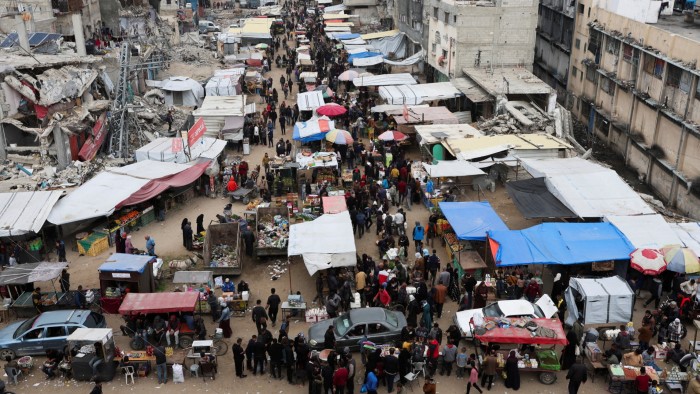Unlock the White House Watch newsletter for free
Your guide to what the 2024 US election means for Washington and the world
After 15 months of unimaginable suffering, the ceasefire between Israel and Hamas will finally bring some succour to the 2.3mn Gazans who have been trapped in a living hell under Israeli siege and bombardment. It should also bring some closure for the Israeli hostages and their families, who have been put through the deepest torment. This is a welcome and overdue respite. But it is, at the very best, only the beginning of the end.
The deal was sealed by Donald Trump. He backed his rhetoric with pressure and ensured the war would pause a day before his inauguration. His intervention seemingly succeeded in prising concessions from both Israel and Hamas. It raises the question, though, of why the US could not have brokered a truce much earlier. The multiphase accord is based on proposals President Joe Biden endorsed last May. But his administration never managed to get Israeli Prime Minister Benjamin Netanyahu to take the necessary steps, instead blaming Hamas repeatedly for the stalemate.
In the interim, Israel’s offensive in Gaza has killed a further 10,000 people, taking the death toll in the strip above 46,000, according to Palestinian officials. At least eight hostages and scores of Israeli soldiers have been killed in Gaza since May. Biden’s failure to persuade Netanyahu to rein in the offensive will be a lasting stain on his legacy.
It is now critical for Trump, Qatar and Egypt to maintain pressure on both sides. A big risk is that Netanyahu observes the first six-week truce, when 33 hostages are due to be released, but refuses to move to the critical second phase: agreement on a permanent ceasefire, release of remaining hostages, and full withdrawal of Israeli troops. Only then can rebuilding of the shattered strip commence.
Serious efforts must begin immediately on a postwar plan for Gaza, something Netanyahu’s government has wilfully ignored. Hamas, which triggered the year of carnage with its horrific October 7 2023 attack on Israel that killed almost 1,200, will not govern Gaza again. But a credible Palestinian alternative is needed, supported by the US and its regional partners. Netanyahu and his far-right allies have persistently rejected a role in Gaza for the western-backed Palestinian Authority, which administers parts of the occupied West Bank. They must not be allowed to scupper the process, though extremists in Israel’s government are already trying.
Trump’s role will be crucial. His first term unabashedly pursued pro-Israeli policies that left Palestinians weaker and ever more marginalised. Yet Trump has made clear he wants to build on the Abraham accords he brokered in 2020, which led to the United Arab Emirates and three other Arab states normalising relations with Israel. That will require pushing for a grand bargain under which Saudi Arabia would agree to diplomatic relations with Israel, opening the door for other Arab and Muslim states to follow. The US president would have to convince Israel to take concrete steps towards the creation of a Palestinian state — ultimately the only solution that will provide it with the security it has always desired.
The other scenario is that Trump pays little heed to the Palestinians and green-lights Israeli expansion of its occupation of Palestinian land, including the West Bank. This would only fuel more militant resistance to Israel, and ensure endless conflict rather than peaceful coexistence.
While Israel emerges militarily stronger, the Biden administration believes Hamas has recruited almost as many new militants as it has lost during the offensive in Gaza. Military might alone cannot defeat an extremist ideology. Only a just and peaceful alternative for the Palestinians can do so. Efforts towards such a solution should start today. The ceasefire will bring much-needed relief. But Israel and the region are still far away from peace.
Source link









